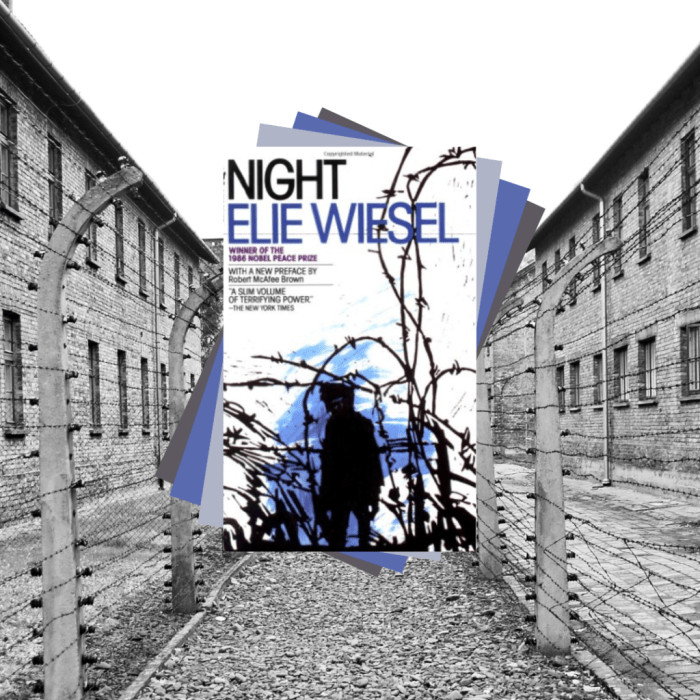Questions from Night by Elie Wiesel probe the profound depths of human suffering, resilience, and the enduring legacy of the Holocaust. Through its haunting prose and unflinching examination of the darkest chapters of history, Night challenges readers to confront the ethical, philosophical, and psychological dilemmas that arise in the face of unimaginable adversity.
The novel’s exploration of the Holocaust provides a poignant and unforgettable account of the atrocities committed against the Jewish people. It serves as a testament to the horrors of genocide and the profound impact it has had on Jewish identity and the collective human conscience.
Literary Elements
In “Night”, Elie Wiesel employs powerful symbolism and imagery to convey the horrors of the Holocaust. For instance, the darkness that pervades the novel represents the moral and spiritual abyss into which the characters are plunged.
Structure and Narrative Style
- The novel is structured as a series of vignettes, each capturing a different aspect of Elie’s experiences.
- The narrative style is spare and unemotional, reflecting the protagonist’s own numbness and detachment.
Language and Tone, Questions from night by elie wiesel
- Wiesel uses simple, direct language to convey the stark reality of the Holocaust.
- The tone of the novel is one of detached observation, as if Elie is recounting events that happened to someone else.
Character Development

Elie Wiesel
- Elie’s character undergoes a profound transformation throughout the novel.
- Initially, he is a devout young boy, but his faith is shattered by the horrors he witnesses.
- By the end of the novel, he has become a cynical and disillusioned survivor.
Other Characters
- Elie’s father provides a sense of stability and support, but his own faith is eventually broken.
- Moishe the Beadle serves as a warning of the horrors that await the Jews.
Psychological Impact
- The Holocaust has a devastating psychological impact on all the characters.
- Elie experiences nightmares, hallucinations, and a sense of guilt and shame.
Historical Context
Holocaust Overview
- The Holocaust was the systematic extermination of approximately six million Jews by the Nazi regime during World War II.
- The Holocaust was a horrific crime against humanity that had a profound impact on the world.
Significance of the Novel
- “Night” is a powerful and moving account of the Holocaust.
- It helps readers to understand the horrors of the Holocaust and the impact it had on the lives of those who survived.
Impact on Jewish Identity
- The Holocaust had a devastating impact on Jewish identity.
- Many Jews lost their faith in God and in humanity.
- The Holocaust also led to a renewed sense of Jewish identity and solidarity.
Ethical and Philosophical Questions
Ethical Dilemmas
- The characters in “Night” are faced with difficult ethical dilemmas.
- For example, they must decide whether to steal food or to help others.
Faith and Spirituality
- The Holocaust challenges the characters’ faith in God.
- Some characters lose their faith, while others find new ways to believe.
Hope and Despair
- The characters in “Night” struggle to maintain hope in the face of despair.
- Some characters find hope in their faith, while others find it in their relationships with others.
Comparative Analysis
Holocaust Literature
- “Night” is one of the most important works of Holocaust literature.
- It is often compared to other works, such as “The Diary of Anne Frank” and “Schindler’s List”.
Similarities and Differences
- “Night” shares many similarities with other Holocaust literature, such as its focus on the horrors of the Holocaust and its impact on the lives of those who survived.
- However, “Night” is also unique in its own way, such as its use of symbolism and imagery and its focus on the psychological impact of the Holocaust.
Impact of Perspectives
- The different perspectives in Holocaust literature provide readers with a more complete understanding of the Holocaust.
- For example, “Night” provides a firsthand account of the Holocaust from the perspective of a survivor, while “The Diary of Anne Frank” provides a firsthand account from the perspective of a victim.
Essential FAQs: Questions From Night By Elie Wiesel
What is the significance of the title “Night”?
The title “Night” symbolizes the darkness and despair that enveloped the Holocaust, a time when the world was consumed by violence and hatred.
How does Wiesel use symbolism and imagery to convey the horrors of the Holocaust?
Wiesel employs vivid and haunting imagery, such as the burning ovens and the piles of corpses, to evoke the unimaginable suffering and dehumanization experienced by the victims of the Holocaust.
What are the ethical dilemmas faced by the characters in “Night”?
The characters in “Night” grapple with complex ethical dilemmas, including the question of whether it is right to steal to survive and the struggle to maintain faith in the face of unspeakable evil.
How does the Holocaust impact the characters’ sense of identity?
The Holocaust shatters the characters’ sense of self and belonging, leaving them questioning their faith, their humanity, and their place in the world.